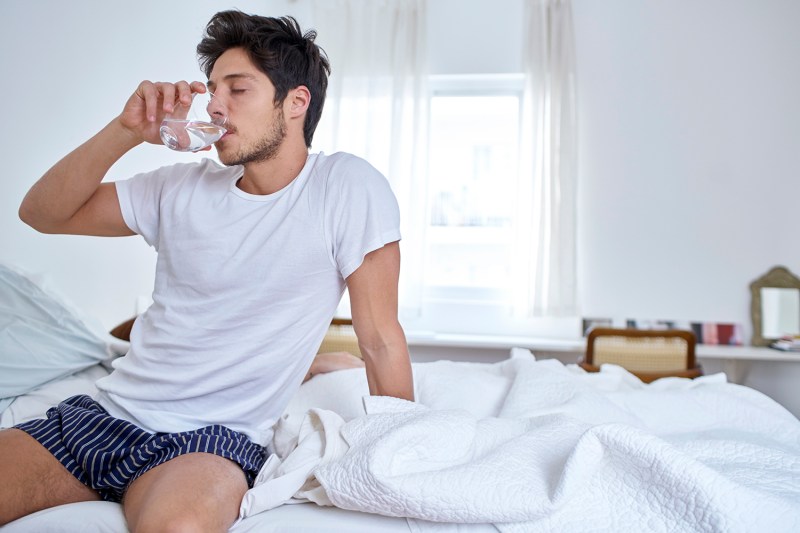
Hangover symptoms can feel like they go on forever — causing a series of uncomfortable symptoms that seem to last the whole next day after drinking. From fatigue to headaches to nausea, a hangover can make you instantly regret drinking and cause you to have a pretty unproductive day. If you’ve ever thought: “I’m never drinking again” after a night out, you’re likely to know hangover symptoms all too well.
Although many of us have thought this at the moment, we often forget all about those annoying hangover symptoms by the time the next night outcomes. While there is no true hangover cure, it is possible to reduce the severity of your hangover symptoms before they occur. Taking these four steps before heading to bed after a busy night of drinking can help you set yourself up for a better post-drinking day with fewer symptoms.

How to prevent a hangover before going to bed
Once you’ve gotten home and realized you’ve drunk a bit too much — don’t panic. Before heading to bed, get yourself prepared with these hangover remedies. If time allows, grabbing these remedies and preparing them on your nightstand can help make it easier to remember once you get home from drinking.
1. Don’t just drink water, add electrolytes
Alcohol works as a diuretic in the body which means it draws water out (hence the frequent need to pee when drinking). Drinking considerable amounts of alcohol can leave you dehydrated and thus, worsen your hangover symptoms. As liquids move faster through your body, remember that you’re also losing essential electrolytes alongside the water.
Drinking an electrolyte supplement after a night of drinking may help reduce your next-day hangover symptoms before they start. Sipping on water with electrolytes during a night of drinking can also help, whenever possible. Drinking alcohol impairs the levels of several important electrolytes in the body, including magnesium, calcium, potassium, sodium, and more. With this in mind, look for an electrolyte supplement or powder that contains high levels of these nutrients depleted during drinking. Also, avoid any electrolytes with high levels of sugar, as sugar can make your hangover symptoms worse.
2. Take a vitamin B supplement
After returning home after a big night out, taking your vitamins might not be the first thing that comes to mind. However, leaving a bottle of a vitamin B supplement near your bed can encourage you to take a few after returning home. Drinking alcohol drains the body of several important nutrients such as several forms of Vitamin B.
Popping a Vitamin B complex pill that contains several forms (such as B12 and B6) before heading to bed might help reduce your next-day hangover symptoms. Research has supported this effort, finding that Vitamin B may help the body more effectively metabolize alcohol as you sleep.
3. Prepare your sleeping environment
Drinking alcohol impairs sleep quality, making it difficult to stay asleep or enter the REM sleep stage, the deepest form of sleep. In turn, not getting enough sleep can exacerbate your hangover symptoms and next-day fatigue. Knowing that alcohol disrupts the sleep cycle ahead of the game, however, can help you better prepare your sleeping environment.
Minimizing disruptions in your sleep environment such as light and noise can help you get as much sleep as possible. One way to do this is to try using a sleep eye mask, which creates a dark sleeping environment to help encourage easier sleep. Any other ways you can help promote a comfortable sleeping environment, such as making the room cooler or using a sound machine, can ultimately help you improve how you feel post-drinking.
4. Eat food
Starting to drink on an empty stomach is a rookie mistake that will leave you more susceptible to hangover symptoms. This is because alcohol enters the bloodstream faster when you haven’t eaten. It’s best to eat food before you begin drinking or as you drink to help your body regulate alcohol levels. If you haven’t eaten anything all night long, try eating a bit of food (with carbohydrates) before heading to bed.

What to do the morning after drinking
As easy as it sounds to implement all of these pre-bed steps to prevent a hangover, life sometimes gets in the way. After a busy night of drinking, you might find yourself unmotivated or too tired to take these steps to prevent a hangover. If that sounds like you — don’t stop reading now. There are still some steps you can take the morning after drinking to help manage your hangover symptoms and feel a bit better.
Drink water with electrolytes in the morning, too
The morning after drinking is not too late to begin drinking water with electrolytes, which still need to be replenished after drinking.
Take an OTC pain reliever
If you’re experiencing body aches or a terrible headache, taking an over-the-counter pain reliever can help take the edge off. Medical professionals recommend opting for over-the-counter NSAID drugs that reduce inflammation (Advil, Aleve) but steer clear of Tylenol, as it can be harder on the stomach.
Eat (the right) food
Hangover-related nausea often leaves many people not too hungry in the morning after a big night of drinking. However, eating breakfast may help you feel better and reduce the severity of hangover symptoms. This is because drinking alcohol causes a drop in blood sugar levels, which can cause hypoglycemic symptoms alongside standard hangover symptoms. To help combat this, try to eat a breakfast that has carbohydrates such as orange juice with a slice of toast. The carbohydrates in this breakfast will help regulate your blood sugar levels back to normal and improve how you’re feeling.



